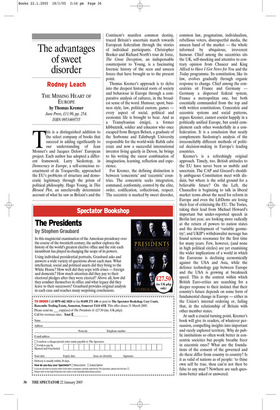The advantages of sweet disorder
Rodney Leach
THE MISSING HEART OF EUROPE by Thomas Kremer June Press, £11.99, pp. 254, ISBN 0953469735 This is a distinguished addition to the select company of books that succeed in adding significantly to our understanding of Jean Monnet’s and Jacques Delors’ European project. Each author has adopted a different framework. Larry Siedentop, in Democracy in Europe, a self-conscious reenactment of de Tocqueville, approached the EU’s problems of structure and democratic legitimacy through the prism of political philosophy. Hugo Young, in This Blessed Plot, an unrelievedly determinist account of what he saw as Britain’s and the Continent’s manifest common destiny, traced Britain’s uncertain march towards European federalism through the stories of individual participants. Christopher Booker and Richard North’s tour de force, The Great Deception, an indispensable counterpoint to Young, is a fascinating forensic history of the seen and unseen forces that have brought us to the present point.
Thomas Kremer’s approach is to delve into the deepest historical roots of society and behaviour in Europe through a comparative analysis of cultures, in the broadest sense of the word. Humour, sport, business style, law, political custom, games every aspect of social, political and economic life is brought to bear. And as a Transylvanian émigré, a former kibbutznik, soldier and educator who once escaped from Bergen Belsen, a graduate of the Sorbonne and Edinburgh University responsible for the world-wide Rubik cube craze and now a successful international inventor living quietly in Devon, he brings to his writing the rarest combination of imagination, learning, reflection and experience.
For Kremer, the defining distinction is between ‘concentric’ and ‘eccentric’ countries. The concentric seeks integration, command, conformity, control by the elite, order, codification, collectivism, respect. The eccentric is marked by sweet disorder, common law, pragmatism, individualism, rebellious voters, disrespectful media, the unseen hand of the market — the whole informed by ubiquitous, irreverent humour. Chief among the eccentrics sits the UK, self-mocking and attentive to contrary opinion from Chaucer and King Alfred to Have I Got News for You and the Today programme. Its constitution, like its law, evolves gradually through organic response to change. Chief among the concentrics sit France and Germany Germany a dispersed federal system, France a metropolitan one, but both essentially commanded from the top and with written constitutions. Concentric and eccentric systems and social patterns, argues Kremer, cannot coexist happily in a politically unified Europe, but could complement each other wonderfully in a confederation. It is a conclusion that neatly complements Siedentop’s analysis of the irreconcilably different methods of political decision-making in Europe’s leading countries.
Kremer’s is a refreshingly original approach. Timely, too. British attitudes to the EU have never been so mobile and uncertain. The CAP and Giscard’s shoddily ambiguous Constitution meet with disdain, but where is the solid ground for a believable future? On the Left, the Chancellor is beginning to talk in liberal market terms about the need for reform in Europe and even the LibDems are losing their fear of criticising the EU. The Tories, taking their lead from Michael Howard’s important but under-reported speech in Berlin last year, are looking more radically at the return of powers to nation states and the development of ‘variable geometry’; and UKIP’s withdrawalist message has found serious resonance for the first time for many years. Few, however, (and none in high political circles) are yet examining the wider implications of a world in which the Eurozone is declining economically against the USA and Asia, while the defence technology gap between Europe and the USA is growing at breakneck speed. This is the context within which British Euro-critics are searching for a deeper response to their instinct that their country’s future depends on some form of fundamental change in Europe — either in the Union’s internal ordering or, failing that, in the relationship of Britain with other member states.
At such a crucial turning point, Kremer’s book will give its readers, of whatever persuasion, compelling insights into important and rarely explored territory. Why do public institutions so often work better in concentric societies but people breathe freer in eccentric ones? What are the foundations of the consent of the governed and do these differ from country to country? Is it as valid of nations as of people: ‘to thine own self be true, thou can’st not then be false to any man’? Nowhere are such questions better asked or answered.













































 Previous page
Previous page